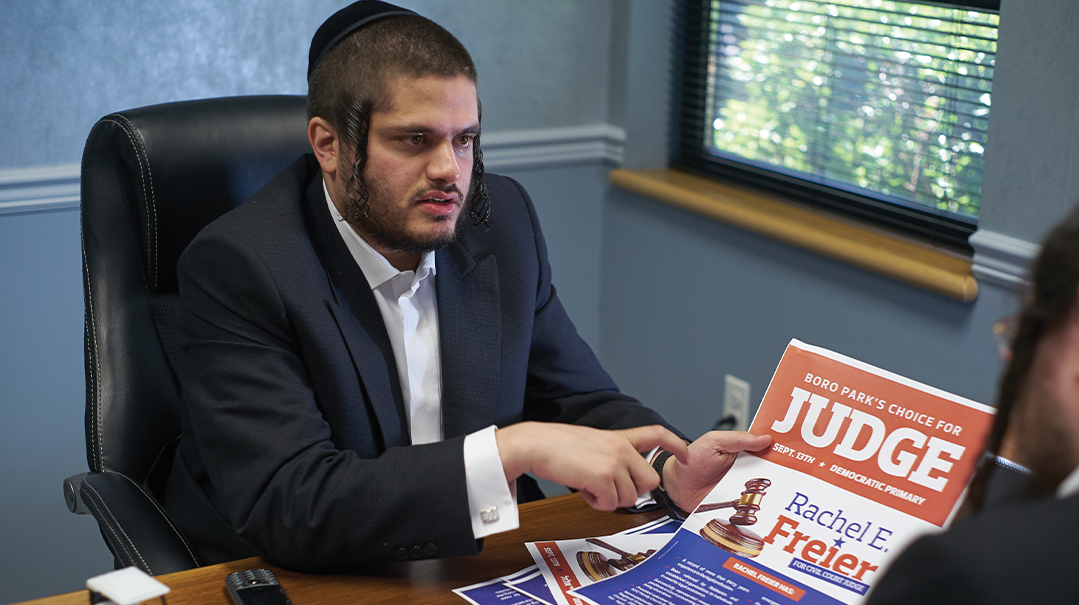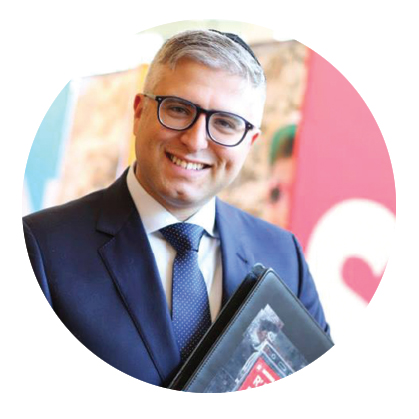Finding His Voice

When he was younger, he sounded off in order to survive. Today he’s an advocate for his people by choice. With Yossi Gestetner’s open mike, no one goes down without a fight

NAME: Yossi Gestetner
LOCATION: Monsey
POSITION: Provider of Public/Community Relations services, news commentator
ROLE MODEL: “I don’t have a role model. However, I consider Chaskel Bennet of Agudath Israel and FJCC a mentor in askanus.”
There is a definite edge to Yossi Gestetner, the way he speaks, even the way he walks. If you’re one of his listeners on the Yiddish-language Kol Mevaser hotline, you hear it in his news analysis. If you read his pieces in the wider Orthodox press, you’ll see it in his punditry. And if you're following political developments in New York's religious neighborhoods, then you saw his effect just last week: he successfully managed Ruchie Freier's victorious campaign for civil court judge and assisted Aron Wieder's successful Democratic primary bid for New York State assembly.
We meet in a Monsey coffee shop: He looks like a thousand other chassidishe yungeleit — which is what makes the fact that he speaks like a knowledgeable conservative radio host so much more intriguing.
Gestetner grew up with those sounds — overconfident hosts, irate callers, spirited debate. “My mother a”h listened a lot to Bob Grant, so that gave me a head start in opinionated politics.”
In yeshivah, he learned how to formulate opinions and present them. Along with discovering a rebbi to whom he remains close until today — the Vienner Rav of Williamsburg — Yossi found a genuine interest in honest give-and-take. “I learned how to talk politics and policy, how to disagree without fighting. I used to send letters to the editors of various publications.”
The political columns in the Yiddish press started when he was still a bochur, but his passion — public relations and advocacy — became reality only after his marriage in 2008.
“Through listening to elected officials, I realized how so often, it’s hard to get things done because people aren’t getting through to each other. Appreciating the value of PR, I launched OJPAC (Orthodox Jewish Political Action Committee), whose mission is to counter the defamation and generalization of the Orthodox Jewish community. I essentially utilize my connection with an understanding of the press to get the community a fair shake in the public arena. In recent years, the world is seeing a new strain of anti-Orthodox bigotry, and there is lots of work to do.”
Gestetner’s skill is sought out by the private sector as well. “I do work for private clients, whether businesses who want PR within the Jewish community or who need help outside, and I also help politicians who need an inside man in the community.”
Yossi mentions the name of a prominent Brooklyn politician who enjoyed support from across the Orthodox spectrum. “We understood that he could get both streams of Satmar and Chabad and the others to support him, but it would take someone who understands the realities of how things work to actually get all these factions together.”
Not all clients are political, though. “The housekeepers in Williamsburg have kind of a union,” Gestetner explains. “They work in chassidishe homes and they’d like to be treated a certain way, paid according to the same standard, things like that. But the employers also have demands, they’d like the help to come dressed modestly, to be reliable. We were brought in recently to help both sides, and hopefully some of what we accomplished will soon be public.”
A big part of cross-community relations work involves tenant-landlord relations. “There is so much mistrust and cynicism between owners of buildings in New York City, particularly Brooklyn, and their tenants. But if you understand both the landlord and tenant communities respectively, you can strip away so much acrimony. In fact, we facilitated buyout negotiations and other agreements between landlords and tenants. Wanting tenants to vacate a building does not need to be a legal nightmare and it's also not a zero-sum situation either. All sides can end up being happy but it takes time, relationships, negotiating skills, and the patience of Hillel. Due to demand, I’m doing more of this kind of work lately.”
While politics might just be a hobby, it’s what gives Gestetner his fame. When we were in line at the coffee shop, a chassidishe fellow stopped and said, “Nu Yossi. What’s going to be with Trump?” Yossi knows it comes with the territory. “If you address the public, then you’re connected to them, you belong to them.”
Media is meant to be impartial, but Kol Mevaser’s in-house political analyst appears to favor Donald Trump in the current elections: Some people feel Gestetner ‘sold his soul’ to Trump and isn’t balanced, as a journalist should be.
“First of all, if I’m speaking about a candidate who I work for, the listeners know it. But that’s not the case here. While I have friends in Trump’s circle, I don’t work for the Trump campaign at this time. Secondly, I’m not a reporter — I am a commentator who happens to report news too, but it's fully acceptable for commentators to have opinions,” Gestetner says in his defense. “Thirdly, while Trump is deeply flawed as a politician and he’s said several unacceptable things, Hillary is incompetent; just look at Syria, Libya, Iran, Iraq, and her failed Russian Reset as examples. Hillary is corrupt; just look at the State Department and the Clinton Foundation. The Clintons have a record of bigoted politics dating back to their days in Arkansas, while Trump has decades of helping minorities and Jewish causes, especially Israel. Besides, Trump has been consistent for decades on certain issues, such as trade, while Hillary slips and slides on all issues. Hillary as a senator actually voted for a 700-mile border wall less than a decade ago!
“Like him or hate him, Trump is a victim of a media smear job, his own mistakes notwithstanding,” Gestetner continues. “The media treat him differently than they do Hillary, and people have a right to know that. The media did the same thing to Romney in 2012 — they took his comments or a story about how he treated his dog, and made it a centerpiece of their coverage. Remember the backlash Romney faced for wanting to defund PBS? Romney was the evil villain and Obama was the saint. That’s what I’m mostly addressing in my rants on Kol Mevaser. The media bias, the hack jobs against Trump.”
It was Yossi Gestetner who arranged the meeting between the wider Orthodox media and Donald Trump before Pesach. “I felt a tremendous respect for the campaign people. They were easy to work with and accessible. I wanted the event for the anti-Semites to see that Trump proudly meets with visibly Jewish people, and Trump, on his side, proudly shared a nice photo of the event on social media. I think the meeting was a great counter to the bigots who try to delegitimize Orthodox Jews. I did it for the Jewish community.”
What about the naysayers who say there is not much we can do to fight bigotry? “Yes, people challenge me, but we know that ‘Halachah… she’Eisav sonei l’Yaakov’ — that’s just the way it is, so why bother?
“Look,” he laughs, “that ma’amar Chazal isn’t a statement of surrender, it's a diagnosis. Yaakov Avinu didn’t shrug and say, ‘Eisav hates me regardless, so what’s the point?’ He prepared himself, as we know, with a three-pronged arsenal of doron, tefillah, and milchamah. We need to be strong on all three fronts — tefillah, of course, but also diplomacy and war, which I take to mean the public relations battle, winning the court of public opinion, communicating our message successfully.
“Besides,” Gestetner qualifies, “ironically, much of the anti-Orthodox bigotry comes not from Eisav, but our own.”
I wonder how Yossi found his voice, his confident, determined tone. He pushes away his plate and a dark look crosses his face. “My parents divorced when I was three years old; it was in the late 1980s. It wasn’t very common then, and money was also tight, so I was pushed around — even within the school system. I learned early on that I have to stand up and speak up in order not to get crushed.”
He brightens. “Things are different now, baruch Hashem. I have an exceptional wife. She is wise and generous, the backbone of our home. And I’m glad that today I do these things for a living, serving as an advocate by choice, rather than as a means of survival. It’s a great gift.”
(Originally featured in Mishpacha, Issue 628)
Oops! We could not locate your form.



